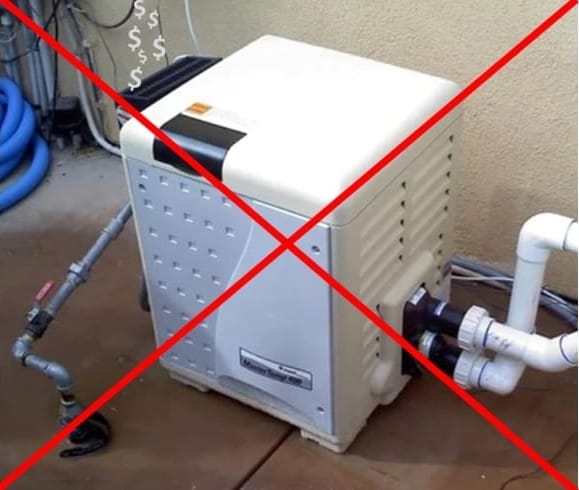
Why gas heaters don't make sense to own
For decades gas heaters have been a staple in the pool industry for a warm pool and for extending the swim season. For decades these heaters have made nearly no improvements to efficacy and only modest improvements (if any) on their exchanger materials. Heat pumps, on the other hand, developed over the last 10-15 years are more efficient, more reliable, and last 2 – 3 times longer. There is almost no good reason for an owner to install a gas heater as they largely benefit the pool installer.
The first reason pool installers love gas heaters is that they appear cheaper. The sticker price is several thousand dollars cheaper than an installed heat pump... while looking at the sticker price. Once the gas line is installed the savings may be less but the sticker price of the contract is still much less and an easier sale for the pool contractor.
The second reason many pool installers like gas heaters is that they require less education to install and work on. They need 110v electric and a properly sized gas line. Heat pumps takes a lot more effort to educate clients on operation and heat strategy. i.e Don't run the heat pump when its 40* F. The installers don't want to answer questions or field concerns from the client as to why. In truth, if you're willing to swim your heat pump can probably heat the pool.
Third- gas heaters are service hogs. They need a lot more work to keep up and running. Temp sensors, flow switches, rotten exchangers, mice damage, flue sensors, ignitors, electronic valves, and so on. There are a lot of parts that are in stock and readily available for gas heater because they break ALL THE TIME driving the service side of the pool business. A service call and changing out a part is pretty decent money for the tech and the life expectancy on the heater itself is in the ball park of 4-5 years and it needs replaced anyway.
From an ownership standpoint... If you are thinking about a salt chlorine generator -don't. Salt does not get along with copper heat exchangers. The salt rots exchangers and quite often salt pools have more chlorine in them because owners forget to turn them down when bather load decreases. The high chlorine and subsequent pH increase deteriorates the copper heat exchanger. Not using salt? Copper in general is much more susceptible bad water chemistry damage in general.
There are gas heaters with exchangers made from Cupronickel or copper-nickel that contains nickel and strengthening elements, such as iron and manganese. The copper content typically varies from 60 to 90 percent and the cost and durability is reflective. Though these exchangers are more corrosion resistant they are not full proof and the price is going up and becoming more comparable to a heat pump.
If the above has not made you think closer about the gas heater headache... Gas is not getting cheaper. Your electric bill may be higher than you like but your gas is getting higher quicker. These units are 80% efficient. Your homes furnace MAY still be 80% but the HVAC industry is working hard to move to high efficiency units and HEAT PUMPS. Why are we still entertaining 80% as a good deal in the pool industry? It is not uncommon for a gas pool heater to consume $1500 -$2000 in gas per year. There goes your initial sticker price 'savings' and then some on year one.
A quality heat pump will last 8-10 years or more, cost a fraction to operate, is guilt $$ free heat, has a titanium heat exchanger with lifetime warranty, and seldom needs repaired.
Pool Article Categories:
Copyright Luxury Pools and Living 2005-2025
Cookie Policy | Privacy Policy